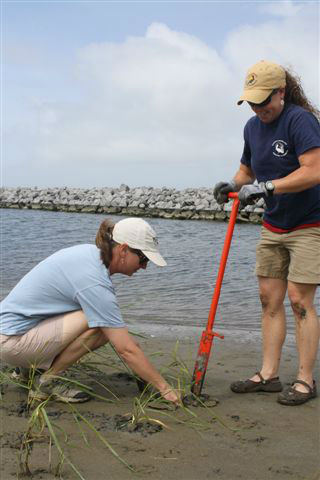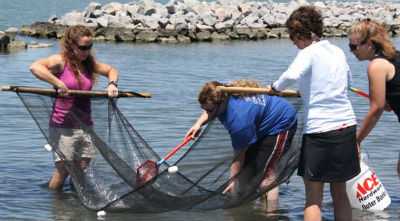 The state spent $7 million renovating the old Coast Guard Station on Ocracoke into a teaching center, which the N.C. Senate now wants to close. Photo: NCCAT |
OCRACOKE — Not quite six years ago, North Carolina officially opened the eastern campus of the N.C. Center for the Advancement of Teaching at the beautifully restored Coast Guard Station on Ocracoke Island. The N.C. Senate now wants to shutter the place up.
Islanders were thrilled that the $7 million state-funded renovation maintained the station’s authentic appearance and was being used for the innovative teacher enrichment programs, preserving its historic character while attracting more business to the island.
Supporter Spotlight
In 2011, the N.C. Coastal Federation helped restore the eroding soundfront shoreline at the station. Several acres of wetlands were built, protecting the state ferry channel and passage for the Coast Guard, which has maintained docks at the station.
Now, with no money for the center’s two campuses included in the proposed state Senate budget released last week, the fate of the coastal campus is up in the air.
“It’s a great resource for Ocracoke as well as North Carolina,” said Alton Ballance, an island native and center staff member, who has conducted popular seminars at the site.
The professional development program, available at no-cost for teachers statewide, offers numerous week-long seminars on the arts, humanities and science and provides advanced educational tools and coping strategies for contemporary challenges. Established by the N.C. General Assembly in 1985, at the encouragement of then-Gov. Jim Hunt, the mission of center is to retain high-quality teachers in K-12 public schools by keeping them engaged and challenged professionally.
 Alton Ballance |
“It’s a program that does not exist anywhere else in the country,” Ballance said. “We have always been proud that North Carolina is a leader in this kind of development.”
Supporter Spotlight
Ballance conducted the first seminar taught at the Ocracoke campus, “Salty Dogs and the Lore of the Sea.”
Elaine Franklin, NCCAT’s executive director, said that she understands that the western campus in Cullowhee, opened since 1985, would become part of adjacent Western Carolina University. But she does not know what lawmakers would want to do with the Ocracoke site.
“I’m not sure what they’re thinking,” she said.
The Coast Guard vacated the three-story, 17,000 square-foot Ocracoke station in 1996, and it sat empty for years. The 1.55-acre property and the buildings were transferred from the federal government to the state five years later, with the understanding that the site would be used for educational purposes. The National Park Service and the Coast Guard still have rights to portions of the property.
Ten years after it was abandoned, the renovation of the building began. The interior was remade into 24 bedrooms and spaces for seminars and dining. It opened for its first seminar in 2007.
Situated between Silver Lake and the Pamlico Sound, the center boasts a spectacular view of the fishing village and the Ocracoke Lighthouse. The handsome building, painted gleaming white and meticulously maintained, today looks like a Hollywood version of the original 1940 Coast Guard Station.
 Teachers helped restore the marsh at the Ocracoke center. |
When the state took over the site, the shoreline along the Pamlico Sound was eroded to the point that the building would be at risk during a storm. It looked unkempt, ragged and unhealthy.
With a grant from Restore America’s Estuaries, secured though the federation, the center and the federation partnered in conducting seminars for educators about the local ecosystem. Participants and local volunteers then planted the new wetlands on the re-graded shoreline, which also had newly-constructed breakwater sills to protect the plantings from waves. In the process of securing the shoreline, the $1.5 million wetlands restoration also has created wildlife habitat and nursery area for fish.
“It’s in great shape,” Ballance said. “It’s another access point. The shoreline and its marsh are doing their job.”
But Ballance, a former English teacher at the Ocracoke School and the owner of a bed & breakfast on the island, said that the center is so much more than its gorgeous coastal or mountain locations. The real value of the program, he said, is what it ultimately gives to the state’s K-12 students through the quality of the alumni’s teaching. Teachers are immersed for a week in a supportive, enriching environment to learn about a broad range of topics and issues that they then bring back to their classrooms.
Some programming is specifically focused on helping beginning teachers across the state; some of it is focused on enriching understanding of culture, history and arts; and some of it is focused on contemporary issues in the classroom and beyond. All of it helps prevent burn-out and helps keep teachers excited about teaching, Balance said.
“There is no other organization that can put teachers together for a few days and really feel the pulse of what’s going on,” he said. “It’s much more about technology and it’s about critical thinking and ultimately preparing these students to be better prepared for the workforce.”
The program also helps educators meet the Common Core State Standards and offers interdisciplinary seminars in STEM, teacher jargon for science, technology, engineering and mathematics teaching, as well as leadership, communication and the arts.
“This was some of the most solid development that teachers have ever received,” said Darcy Grimes, the 2012-2013 N.C. Teacher of the Year. “It allows teachers to collaborate, to create connections and to network with other teachers.”
Grimes, a third grade teacher at Bethel Elementary School in Watauga County who has participated in seminars at both campuses, said the stimulating environment and shared insight and knowledge ultimately makes a better teacher. If the program closed, she said, the impact would be felt statewide.
“It’s going to be hurting students,” she said.
 Teachers explore the animal life of the marsh in a seminar that the federation helped lead. |
The seminars are offered to all public K-12 teachers in the state, including those at charter schools. According to information provided by the center, in 2010-2011, more than 2,500 teachers and administrators were served in 105 seminars. About 200 first-year teachers also attended special induction programs, providing about 30 contact hours –typically over four days-per person, resulting in more teachers staying in the profession.
After cutting its budget by $2 million in 2008, the legislature in 2011 slashed the center’s budget 50 percent to $3 million. Thirty full-time and 11 hourly positions were cut in Cullowhee and two were cut in Ocracoke, and 75 percent of the professional development seminars at both campuses were eliminated. Of them, six of Ocracoke’s nine fall seminars were cancelled.
In a 2009 article in the Carolina Journal, which referred to the center as a “teacher paradise,” state Sen. Pro Tempore Phil Berger, an Eden Republican, then the Senate minority leader, said that education funding should address core needs, and that the center was not one of them.
“It’s something we shouldn’t be spending a whole lot of money on when we have shortages in the budget and are looking at raising taxes in a recessionary economy,” he said in the article.
The Carolina Journal is a publication of the John Locke Foundation, a conservative think-tank in Raleigh.
Seminar costs, including food, books and lodging, are paid for by the state for qualified educators whose applications are accepted. Recent figures were not available, but in 2006, a five-day seminar cost about $1,800 a person. That same year, it also cost the state about $12,000 to replace a teacher.
 Elaine Franklin |
But Franklin said that the center does much more than offer seminars. Over the years, the mission has diversified, including serving as an intermediary between business and the state’s school systems. The center is also a resource for educational groups looking for solutions for issues they are confronting, saving the state the need to hire a private consultant.
“We really have worked at transforming NCCAT,” she said. “After we had to make those cuts in staffing, we really looked at how we can be responsive to what teachers have to do right now. We’re looking at multiple ways we can serve teachers that are not campus-based.”
Programming is focusing on the “teach-the-teacher” model, drop-out prevention, leadership skills and blended face-to-face and online learning opportunities. Staff also goes to the school districts and communities directly.
“We are really looking at helping teachers be 21st –century teachers,” she said. “We are looking at ways we can reach a larger audience.”
Franklin said she is hopeful that the state House budget will restore center funds. The center has asked businesses and groups in the state to sign on to a letter to House leaders requesting that funding be restored in that chamber’s budget. Some teachers have started a petition in support of the center.
But now that its budget has been eliminated by the Senate, Franklin is finding that nearly all fundraising has come to a skidding halt.
Pending grant proposals include The Development Foundation of NCCAT Inc., for $402, 421, she said. The center also has a confirmed continuing contract of about $180,000 from the state Department of Public Instruction for NCCAT’s Data Literacy Initiative.
For fiscal year 2012-2013, NCCAT received a total of $412,869 in contracts, and $270,000 in grants.
“What is happening is it’s preventing us from having a lot of outside funds come in, and I’m talking about hundreds of thousands of dollars,” she said about the budget snub.
“When funders and donors see that, unfortunately, it makes them extremely reluctant to give.”







